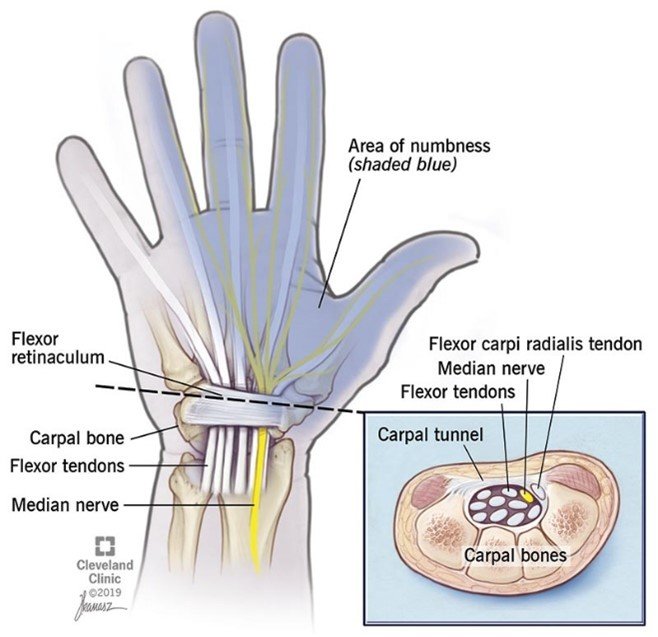
Have you ever noticed yourself waking up at night or first thing in the morning shaking your hands to “get the blood flowing”? Maybe your fingers feel like those moments when you sit on your foot for too long and it “goes to sleep” only to start burning, tingling, or even itching as it “wakes up”. It can happen after typing, talking/texting on your phone, or driving to the store. And for some people becomes a daily nuisance. Believe it or not, these are usually symptoms of a nerve being pinched somewhere along its course instead of a blood flow issue.
When people come to the office with any of the symptoms mentioned, the first diagnosis that will usually run through the mind of a hand surgeon is that of nerve compression. And while many types of compression exist, one of the most common and most recognized is carpal tunnel syndrome.
Often correlated with repetitive activities such as typing or pulling
weeds, carpal tunnel syndrome is irritation or compression of the
median nerve as it crosses the wrist into the hand. The median nerve
typically supplies sensation to the thumb, index, long and part of the
ring fingers as well as some of the small muscles in your hand
(Fig. 1). Compression of this nerve can happen for a variety of
reasons, but the symptoms of burning, tingling, numbness, and/or pain
are the same regardless of the reason for compression.
After an evaluation by a hand specialist, early treatment can at times consist of night-time bracing, stretching, and oral anti-inflammatory medications. At times, symptoms do not resolve, or the severity warrants more aggressive treatment and surgical release is suggested. The great news is that after surgical treatment most people experience a significant improvement in their symptoms that can occur within the first few days after surgery. Many people even go so far as to say they sleep better than they had for years preceding their surgery because their hands do not wake them up anymore.
Bothered by symptoms of hand and/or finger numbness, tingling, burning, and/or pain? Dr. Worrell would be happy to take a look. A visit to clarify the diagnosis, evaluate severity, and discuss options will help you make an informed decision about how you would like to go about relieving the symptoms.
(Fig.1: https://my.clevelandclinic.org/health/diseases/4005-carpal-tunnel-syndrome)
